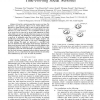Free Online Productivity Tools
i2Speak
i2Symbol
i2OCR
iTex2Img
iWeb2Print
iWeb2Shot
i2Type
iPdf2Split
iPdf2Merge
i2Bopomofo
i2Arabic
i2Style
i2Image
i2PDF
iLatex2Rtf
Sci2ools
167
click to vote
ASUNAM
2015
IEEE
2015
IEEE
AFRAID: Fraud Detection via Active Inference in Time-evolving Social Networks
—Fraud is a social process that occurs over time. We introduce a new approach, called AFRAID, which utilizes active inference to better detect fraud in time-varying social networks. That is, classify nodes as fraudulent vs. non-fraudulent. In active inference on social networks, a set of unlabeled nodes is given to an oracle (in our case one or more fraud inspectors) to label. These labels are used to seed the inference process on previously trained classifier(s). The challenge in active inference is to select a small set of unlabeled nodes that would lead to the highest classification performance. Since fraud is highly adaptive and dynamic, selecting such nodes is even more challenging than in other settings. We apply our approach to a real-life fraud data set obtained from the Belgian Social Security Institution to detect social security fraud. In this setting, fraud is defined as the intentional failing of companies to pay tax contributions to the government. Thus, the social n...
| Added | 16 Apr 2016 |
| Updated | 16 Apr 2016 |
| Type | Journal |
| Year | 2015 |
| Where | ASUNAM |
| Authors | Véronique Van Vlasselaer, Tina Eliassi-Rad, Leman Akoglu, Monique Snoeck, Bart Baesens |
Comments (0)

